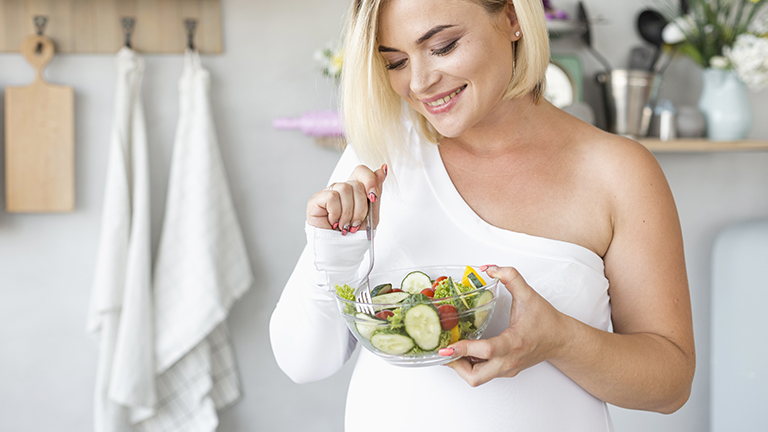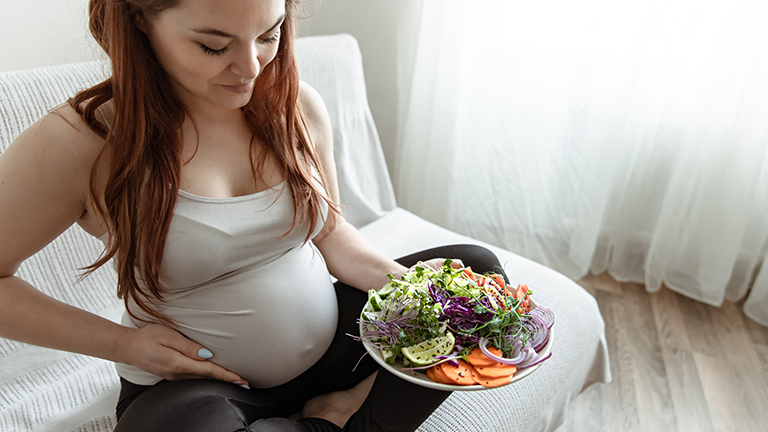Postpartum Weight Loss Diet: After childbirth, Postpartum Weight Loss occurs when a person slowly loses weight. After delivery, women can safely lose weight by incorporating a balance of healthy eating, adequate hydration, and gentle exercise into their daily monitoring. By incorporating nutrient-rich foods, lean proteins, fiber, and healthy fats to their eating plan, new mothers can help facilitate their recovery, increase their metabolism, and sustain their energy levels, all while preserving their health and wellbeing.
Table of Contents
Introduction to Postpartum Weight Loss Diet
Many new moms want to lose weight after giving birth, but postpartum weight loss diets aren’t just about aesthetics. Weight loss is important for energy levels, breastfeeding, and overall health. While losing weight is a worthy goal, nursing moms should focus on postpartum nutrition to safely recover from childbirth.
Some challenges new moms encounter are hormonal changes, lack of sleep, and time restraints. Learning how to balance nutrition and calories to achieve a healthy and sustainable postpartum weight loss is vital.
Key Principles of a Postpartum Weight Loss Diet
Rehabilitation and Weight Loss Alongside Dietary Balance
Dietary balance refers to eating enough protein, carbohydrates, and appropriate vs. healthy fats. In essence, this refers to prioritising nutrient dense foods rather than counting caloric-dense foods, while providing sufficient energy and recovery support after childbirth.
Calorie Control is Essential
Your caloric needs will be heightened while breastfeeding, however, it is safe to create a slight calorie deficit to achieve gradual, postpartum period weight loss. However, do not engage in any extreme diets, as they could affect your milk supply and your overall health.
Role of Macronutrients
- Proteins: Necessary for muscle recovery and satiety. It is important to have lean meats, fish, eggs, dairy, legumes, and plant-based protein sources.
- Carbohydrates: Choose carbohydrates that are complex such as whole grains, oats, quinoa, and brown rice, to prevent energy spikes.
- Fats: Utilise healthy fats from nuts, seeds, avocados, and olive oil, to balance hormones.
Hydration and Its Impact
It is important to stay hydrated to support postpartum weight loss and health. Drinking enough fluid helps metabolism, digestion, and produces milk for breastfeeding moms. Drinking fluid also helps control appetite, avert tiredness, and assists energy. Include water-dense fruits and vegetables, herbal tea, and limit sugary beverages to help stay on track.
Foods to Include in a Postpartum Weight Loss Diet
Lean proteins are important for recovery and weight loss in the postpartum period. Lean proteins, including chicken, turkey, fish, eggs, Greek yogurt, and legumes, provide amino acids that assist in repairing tissues and promotes a feeling of fullness. These foods will also promote metabolism, energy, and help new moms recover after childbirth.
Fiber-Rich Foods for Satiety
Incorporating foods rich in fiber into your postpartum nutrition will help you feel full for longer and assist in digestion.
When you consume vegetables, fruits, whole grains, legumes, and nuts, you are getting a nutritionally and fiber dense food that helps your body naturally lose weight after giving birth.
Fiber also helps stabilize blood sugar levels, lower cravings, and continue to promote digestional health for postpartum women.
Healthy Fats for Hormonal Balance
Postpartum hormonal balance and well-being ultimately comes down to getting fats. Fats come from a variety of sources: avocados, olive oil, nuts, seeds, and fatty fish, which contain omega-3 and monounsaturated fats that promote hormone regulation, brain functions, and energy levels after birth. Eating healthy fats is good for recovery and long-term weight loss.
Fruits and Vegetables for Vitamins and Minerals
Fruits and vegetables are vital sources of vitamins, minerals, and antioxidants that help you recover from the stress of childbirth. Leafy greens and berries, for example, provide an important immune boost, while citrus fruits and sweet potatoes can provide energy and a sense of well-being. When you eat a variety of colourful fruits and vegetables, you’ll know that you have all the nutrients you need and feel more set up for natural postpartum weight loss.
Foods to Avoid After Pregnancy
Processed and Sugary Foods
Minimising processed and sugary foods is key for postpartum weight loss. Sweets and snacks that come in a package, as well as sodas, can cause fluctuations in energy levels, extra weight gain, and inadequate nutrition. Whole, natural foods can help sustain blood sugar levels, boost energy, and support recovery in new mothers.
Empty Calories and Unhealthy Snacks
For postpartum weight loss, it is important to skip over the empty calories and unhealthy snacks. Food products that are high in refined carbohydrates, saturated fats, and artificial additives have little-to-no nutrition when it comes to weight loss (chips, pastries, and fried foods). Instead, choose nutrient-dense snacks to help maintain energy and support health during the postpartum period.
Excessive Caffeine and Alcohol
It is important to try to limit caffeine and alcohol during the postpartum period to protect your health. Caffeine in excess can interfere with your sleep and your baby’s feeding regime, while alcohol may adversely affect milk production and recovery. Moderation, along with water and herbal beverages, can help to sustain energy and can facilitate safe postpartum weight loss.
Sample Postpartum Weight Loss Meal Plan
Breakfast Options
- Oatmeal with berries, chia seeds, and almond butter
- Greek yogurt with flaxseed and sliced banana
- Scrambled eggs with spinach and whole-grain toast
Lunch Ideas
- Grilled chicken salad with mixed greens, avocado, and olive oil dressing
- Quinoa bowl with black beans, roasted vegetables, and a drizzle of tahini
- Whole-wheat wrap with turkey, hummus, and fresh veggies
Dinner Recommendations
- Baked salmon with brown rice and steamed broccoli
- Vegetable stir-fry with tofu and quinoa
- Grilled lean steak with sweet potato mash and green beans
Healthy Snacks and Beverages
- Mixed nuts and seeds
- Fruit smoothies with protein powder
- Carrot and cucumber sticks with hummus
- Herbal teas and infused water
Combining Diet with Exercise
Safe Postpartum Workouts
Safe postpartum exercise allows new mothers to reclaim strength and help with weight loss. Gentle movements, such as walking and stretching, combined with light-impact yoga, are a good start. As your body allows for more recovery, core work and light strength training can be added. Speak with your physician to ensure your health and fitness before beginning any exercise program, as safety and effectiveness are individual to each person.
Benefits of Walking, Yoga, and Strength Training
Integrating walking, yoga, and strength training into your postpartum period provides multiple benefits. Walking speeds up metabolism and enhances cardiovascular health, yoga enhances flexibility and lowers stress, and strength training promotes the rebuilding of muscle and promotes fat loss. Combining these three activities, the benefits include an increase in energy and mood and overall recovery post-baby and postpartum that is safe.
Tips for Successful Long-Term Weight Management
Meal Preparation and Planning
Preparing meals ahead of time helps in portion control and maintains eating healthy on busy days.
Mindful Eating Strategies
Tune into your hunger cues, slow down your eating pace, and put away, or turn off, any possible distractions to avoid overeating and promote long-term weight management post-birth.
Tracking Your Progress in a Safe Way
Weigh and gauge your energy levels once a week. Avoid an obsession with tracking, and highlight what progress you are making, however small, to get healthy and fit.
Expert Opinions on Postpartum Weight Loss
Advice from Nutritionists
Nutritionists recommend foods high in nutrients, balanced meals, and modest amounts of weight-loss over time to positively impact maternal and infant health.
Advice from Ob/Gyns
Ob/gyns recommend waiting about 6 to 8 weeks postpartum to begin a “planned” weight-loss program to give the body, both nutritionally and physically, time to heal.
Why Plans should be Individualised
Each mother’s postpartum journey is unique. Individualised nutrition and exercise plans may be the best approach for weight-loss postpartum that is both safe and effective.
Common Myths About Postpartum Weight Loss
Quick Dieting vs Slow Weight Loss
Crash diets can result in a lack of vitamins or nutrients and may impact breastfeeding. A slower weight loss of 0.5-1 kg (1-2 lb) per week is generally considered to be a safe and sustainable rate. “One-Size-Fits-All” Diet Plans
Every mother is different with respect to metabolic rate, how long they are breastfeeding, and recovery timelines. Avoid diets that claim to be one-size-fits-all and are promising to be quick.
Conclusion
A weight loss plan and postpartum nutrition should involve healthy eating, moderate calorie restriction, and safe amounts of physical activity after giving birth. New moms can lose weight and improve their overall health while maintaining energy for breastfeeding their babies by incorporating healthy food choices, practising mindful eating, and working with a qualified health professional. For additional support with postpartum weight loss, health professionals who understand postpartum nutrition, like instructors from Postpartum Nutrition 101, help moms confidently navigate postpartum weight loss. Health professionals are helpful to moms who want to work on their postpartum caloric needs, healthy average calorie restriction changes, and avoid common postpartum mistakes related to postpartum weight loss.



